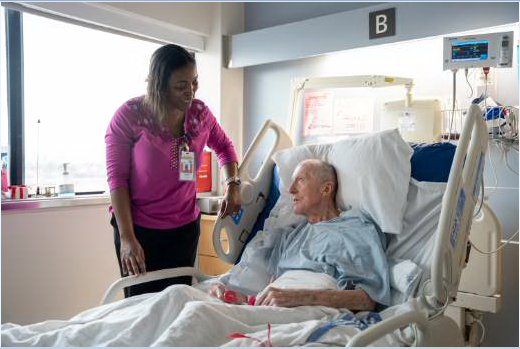Rehabilitation success stories during the COVID pandemic

Tuesday September 15, 2020 is being celebrated as “Rehabilitation Day” by proclamation of Mayor John Tory on behalf of Toronto City Council.
This is an important day to recognize and thank those who dedicate their lives to helping others through rehabilitation services.
At North York General, occupational therapist, physiotherapists, speech-language pathologists, and rehabilitation assistants provide our patients with a variety of inpatient and outpatient services to enhance their functional abilities, ensure safety, and improve quality of life. Below are only a few of the many stories highlighting the impact rehabilitation has had on our patients and residents throughout COVID-19.
One step at a time – Occupational therapy
An elderly patient was admitted to the geriatric medical unit and while awaiting admission to Long-Term Care due to underlying Alzheimer’s, an occupational therapist worked with him daily to provide cognitive stimulation. The patient was engaged in activities to regain orientation, address memory issues and support his emotional well-being during the isolation he experienced during the pandemic. One technique the patient found extremely valuable was meditation.
Patience and perseverance – Physiotherapy
During the pandemic, unit demographics were modified and additional physiotherapy (PT) and rehab assistant (RA) services were allocated to support the geriatric mental health unit. An elderly patient was transferred to the unit and had been refusing to get out of bed for some time. With patience and perseverance, the PT & RA were able to persuade this patient to perform bed exercises and eventually get out of bed and mobilize with supports. This intervention made a significant impact on both his physical and emotional well-being.
Making a world of difference – Speech-language pathology
A middle-aged man severely ill with COVID-19 was admitted to the Intensive Care Unit (ICU), required a tracheostomy and experienced neurological impairment. Due to swallowing difficulties, a G-tube was required for feeding. After a lengthy ICU stay, he was transferred to an inpatient unit and the tracheostomy was removed. At this time, a Speech-Language Pathologist (SLP) was consulted to address management of his swallowing difficulties (dysphagia). A bedside video fluoroscopy assessment was performed to determine appropriate intervention. The SLP worked with this patient to gradually advance him to manage oral snacks with ongoing enteral support. The patient was very happy to resume some oral intake at discharge, and with additional SLP treatment will likely resume full oral nutrition in the future.
